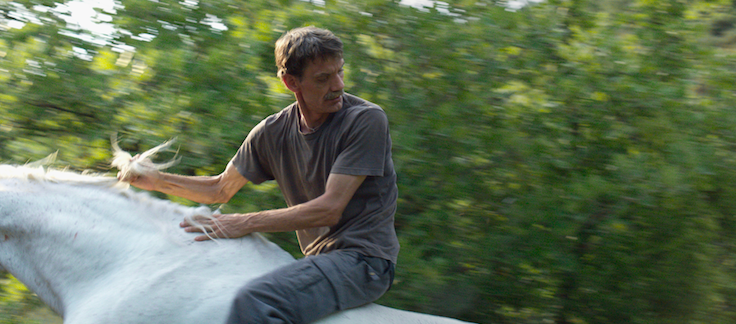How do we interact with strangers and engage with foreign countries? The film “Western” tells the story of German construction workers sent to build a hydroelectric power station in Bulgaria, where their encounters with local villagers do not, to put it mildly, always go smoothly.
An almost forgotten genre used to tell a very topical story: German director Valeska Grisebach’s third feature film, Western, is exactly what the name would seem to indicate. The reimagined Western has garnered critical acclaim since premiering at the 2017 Cannes Film Festival. This may in part be because it addresses migration and xenophobia, the hot topics dominating debate in Europe today. In Western, Grisebach portrays how people from two European countries come to a better understanding, sometimes even finding friendship, despite very different cultures and languages.
Modern Western in Eastern Europe
“As a genre, the Western I grew up with in 1970s West Berlin still holds a unique, homey fascination for me,” Grisebach says. As the setting for her first Western, she chose the same backdrop against which Winnetou and Old Shatterhand, played by Pierre Brice and Lex Barker in the 1960s, once swore an oath of brotherhood. Many of the popular German films based on the books of Karl May were in fact shot in the Balkans instead of the USA.
Unlike its predecessors,
Western is not set in America though. It takes place here, in rural Bulgaria, where a group of German construction workers has been sent to build a hydroelectric power station along a river. Against a backdrop of sweeping landscape tableaus, Grisebach’s tale follows the construction team as they get to know the unfamiliar region. The men seem to view Bulgaria as a kind of Wild West, where the usual rules and civilizing forces don’t apply.
Grisebach’s narrative also adopts an element of the traditional Western plot: an archetypical conflict between two male protagonists. Here the showdown is between considerate, charming Meinhard, the one German newcomer interested in initiating contact with the villagers, and sexist, violence-prone Vincent, who exhibits distain for the locals. Meinhard is portrayed as a “lonesome cowboy”, a quiet outsider. While he initially claims, “I am here to earn money,” it soon becomes apparent that he is looking for much more, for a sense of home and belonging, and a new cultural identity in this foreign land.
The film begins as a character and milieu study focused on the dynamics within the group of men – braggadocio around women, ritualized machismo, and coarse conversations, but also moments of friendship and solidarity around the evening campfire. The film is unique in that it features amateur actors, “real” construction workers, some of whom Grisebach approached on the street. Like main character Meinhard Neumann, who she happened to spot at Pferdemarkt Fair in the town of Havelberg near Berlin: “It was like suddenly being face to face with a film icon, as if he had climbed straight out of a Western from the thirties or forties, and was ready to climb right into my film.” Others, like scaffolder Reinhardt Wetrek who plays Vincent, auditioned for their roles. The actors were involved in writing the dialogues, and each speaks his native dialect, lending the performances a very natural flow.
-
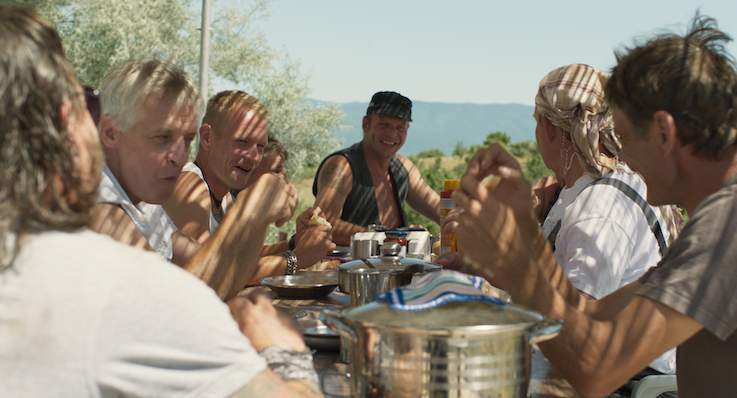 © 2017 Komplizen Film, Chouchkov Brothers, coop99, KNM
© 2017 Komplizen Film, Chouchkov Brothers, coop99, KNM
The film “Western” tells the story of German construction workers sent to build a hydroelectric power station in Bulgaria.
-
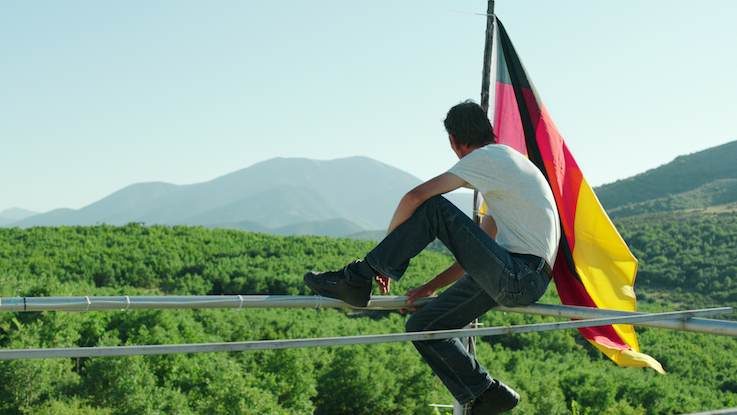 © 2017 Komplizen Film, Chouchkov Brothers, coop99, KNM
© 2017 Komplizen Film, Chouchkov Brothers, coop99, KNM
The workers seem to view Bulgaria as a kind of Wild West: they raise the German flag over their camp and aggressively hit on the village women.
-
 © 2017 Komplizen Film, Chouchkov Brothers, coop99, KNM
© 2017 Komplizen Film, Chouchkov Brothers, coop99, KNM
The considerate, charming construction worker Meinhard (Meinhard Neuman) is the one German newcomer interested in initiating contact with the villagers.
-
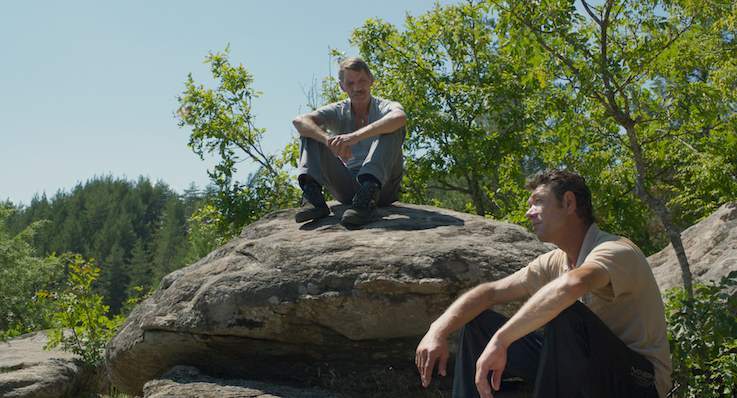 © 2017 Komplizen Film, Chouchkov Brothers, coop99, KNM
© 2017 Komplizen Film, Chouchkov Brothers, coop99, KNM
Meinhard befriends the village bigwig Adrian, and while the two men often seem to talk at cross-purposes, they come to understand either other on a more emotional level.
-
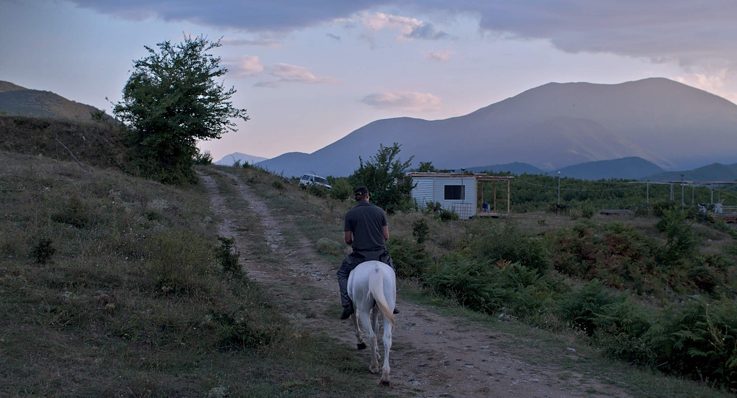 © 2017 Komplizen Film, Chouchkov Brothers, coop99, KNM
© 2017 Komplizen Film, Chouchkov Brothers, coop99, KNM
As the setting for her first Western, director Valeska Grisebac chose rural Bulgaria as backdrop.
-
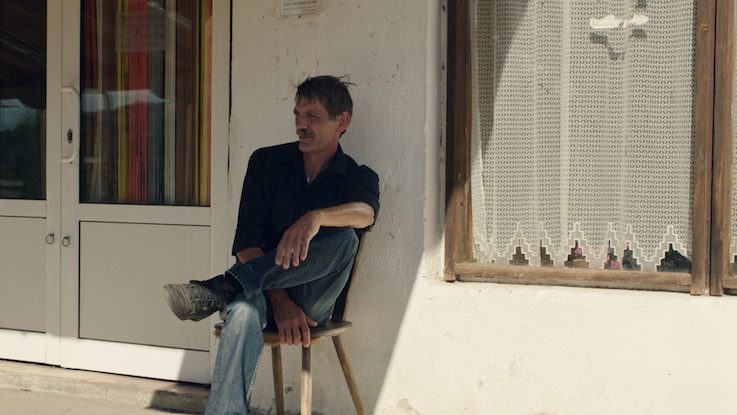 © 2017 Komplizen Film, Chouchkov Brothers, coop99, KNM
© 2017 Komplizen Film, Chouchkov Brothers, coop99, KNM
Is Meinhard the winner? As such, there are no clear-cut winners or losers in “Western”.
Mishaps and misunderstandings
Bit by bit the film depicts the first interactions between the visiting Germans and local Bulgarians. Logistical problems repeatedly slow down construction on the hydroelectric power station, giving the men time to explore the area. But initiating contact with the inhabitants of a neighbouring village is not always easy, and that’s putting it mildly. This is due in large part to the visitors’ boorish behaviour, as they raise the German flag over their camp and aggressively hit on the village women.
The language barrier often leads to miscommunications. Both construction workers and the villagers exclusively speak their respective mother tongue, and only have a very rudimentary command of English, if at all. The dialogue was not dubbed, which serves to highlight the mishaps and misunderstandings. Grisebach places her audience squarely between the two worlds, as viewers follow both sides of the dialogue via subtitles.
The film also shows how communication can sometimes transcend cultural and language barriers. Meinhard befriends the village bigwig Adrian, and while the two men often seem to talk at cross-purposes, they come to understand either other on a more emotional level. In one particularly moving scene, Meinhard talks about the trauma of losing his brother. And although Adrian can’t speak a word of German, he immediately understands that Meinhard is sharing a tragic story.
Western doesn’t come to a conclusion about the right way to approach the other, and there is no definitive division into good and evil as in a classic Western. As such, there are no clear-cut winners or losers either. The film refrains from giving a pat answer and provides ample food for thought. This is cinema that explores and investigates, reflecting the challenges of our time as it tries to identify the best way forward.
Valeska grisebach
A director and lecturer at the Deutsche Film- und Fernsehakademie Berlin (i.e. German Film and Television Academy Berlin), Valeska Grisebach was born in Bremen in 1968 and grew up in and still lives and works in Berlin. After completing a degree in philosophy and German studies, she enrolled at the Filmakademie Wien (i.e. Film Academy Vienna) in 1993. Her 2001 thesis film Mein Stern (i.e. Be My Star) won a number of awards, as did her second film, Sehnsucht (i.e. Longing), presented at Berlin’s international film festival, the Berlinale in 2006. Western is her third feature film, which premiered at the 2017 Cannes Film Festival.
